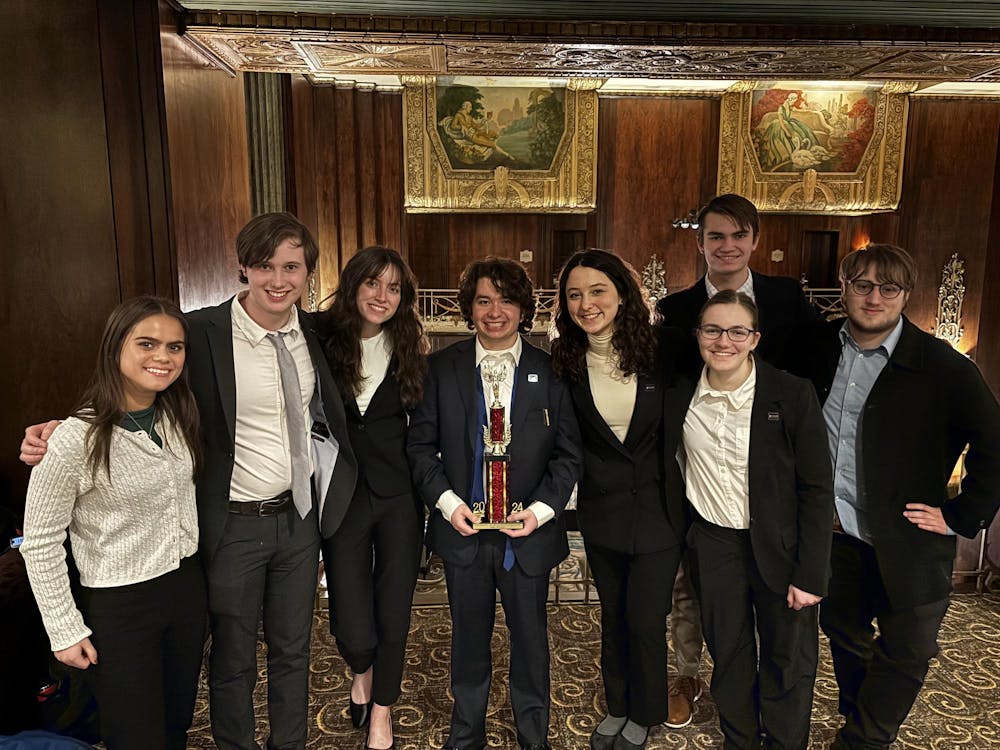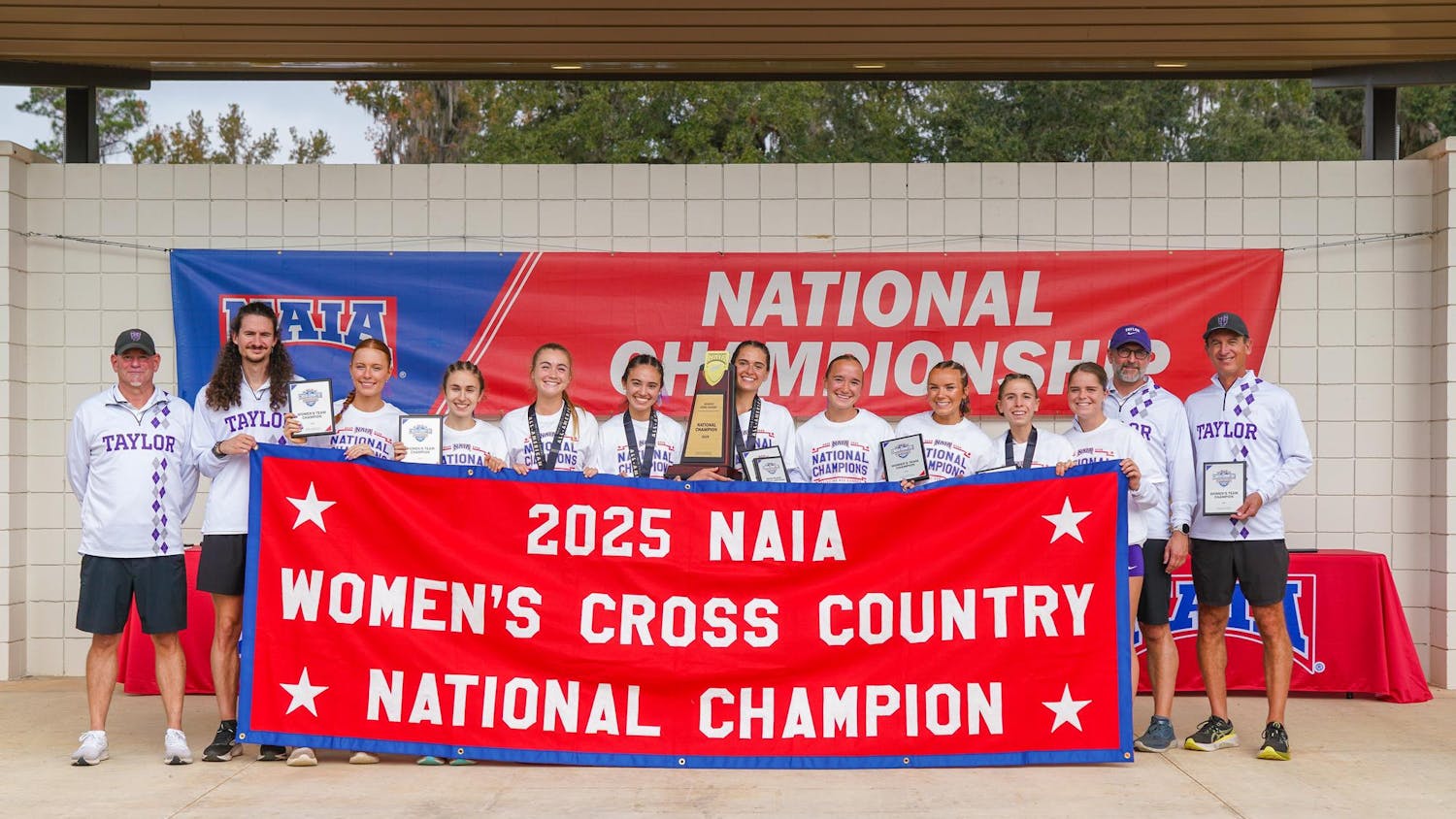Taylor University’s Ethics Bowl team walked away as semi-finalists from the 2024 Association for Practical and Professional Ethics (APPE) Intercollegiate Ethics Bowl (IEB) National Competition — the furthest they have made it since their National Championship victory in 2015.
Out of 36 teams, Taylor made it to the final eight alongside semi-finalist Whitworth University and quarter-finalists Georgia Tech, Stanford University, Utah Valley University and Vanderbilt University. The University of North Carolina at Chapel Hill won the overall National Competition.
In November, Taylor’s Ethics Bowl Team competed in the Central States Regional Ethics Bowl competition at Marian University. The team placed third, qualifying them for nationals, Koert Verhagen, Ethics Bowl coach and assistant professor of philosophy and religion, said.
“What I love about Ethics Bowl is that it is a context in which students voluntarily — because most of them don't take it for credit — come together to try to think well about issues that shape the world we live in,” Verhagen said. “And they're trying to think well about those issues as Christians from a distinctively Christian perspective but, toward the end, articulate their positions in a way that's publicly accessible.”
Each year, there are a set of topics, or, “cases” that contestants need to prepare for leading up to the competition. Which of these issues will be discussed is unknown. Cases this year varied from topics such as whether the U.S. is responsible for integrating soldiers from the military back into society to AI simulation dating, Verhagen said.
The team had spent the first portion of the fall semester preparing nine cases for regionals. Once eligible for nationals, they spent January and February gathering and assembling 17 new cases — each one ranging from one to one and a half pages long.
The team met every weekday for multiple hours during the whole month leading up to the competition.
For each outline, they compiled and considered various components surrounding the case, including morally significant aspects, additional research points, potential questions, answers to those questions and rebuttals for counterarguments. Alongside these pieces, the team assembled a 10-minute presentation on each case presenting their position and justification.
“So basically, the goal is a position that coheres, is consistent and is supported well by reasons for why we think this is the most ethical kind of path forward,” Elliana Trice, a senior psychology and philosophy double major and Taylor Ethics Bowl member, said.
From Feb. 24-25, the Taylor team participated in the national competition hosted in Cincinnati. Their group comprised a wide array of majors including kinesiology, mechanical engineering, pre-nursing, philosophy, politics and law, psychology and political science, philosophy and economics.
Taylor students Peter Schwarck, Elliana Trice, Charlotte Ostric, Josh Brown, Isabel Draper, JJ Heika, Abigail Vlietstra and Sebastian Anderson participated.
“We're all very different personalities, and we all kind of tend to come at issues very differently from different perspectives,” Trice said. “But at the same time, we've really learned how to listen to each other, which is not always easy when you have your own opinions.”
Because of the varying disciplines and topics comprising the cases, this type of diversity in majors allowed for the team to pull from a wide range of personal knowledge and experiences, Verhagen explained.
Each competing team is guaranteed four rounds. In each round, two universities are pitted against one another, individually presenting a different case without knowing which it is or what question will be asked until the day of the competition.
“And that was actually, really, I think really our team's strength — that when there were surprised questions, they were able to pivot where other teams weren't,” Verhagen said.
Presenters have two minutes to prepare and adjust their case in each round.
The judges then score each team out of 60 points based on presentation, commentary on the other team’s presentation, response to the other team’s commentary and their response to the judges, Verhagen said.
“Last year, when they went to nationals, they lost all four of their preliminary rounds,” Isabel Draper, a freshman engineering major and Taylor Ethics Bowl member, said. “It’s just, a lot of it kind of comes down to what cases do you get, what judges do you get, what's the other team like. And all that's out of your control.”
However this year, Taylor’s team ranked top four. They were ultimately defeated in a round with the eventual national winner, the University of North Carolina at Chapel Hill.
For Verhagen, Ethics Bowl is about student moral formation and spiritual growth first; the competition comes second.
Other skills such as public speaking, being able to communicate ideas clearly, critical thinking abilities and being able to collaborate with others are all benefits of being a part of Ethics Bowl that Trice has learned since joining Ethics Bowl as a junior.
“Everyone talks for every case — that was our strategy this year,” Trice said. “So no matter who's got the primary on a certain piece, we all had a part, we all had something to say. It's very much a group effort and it has taught me to work with other people more effectively.”





